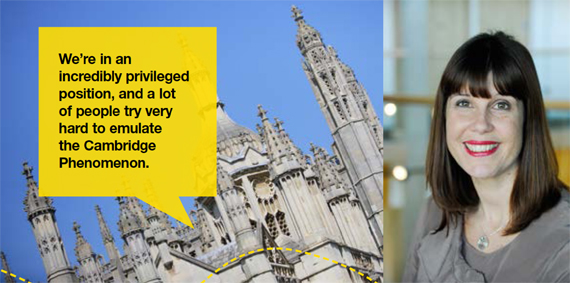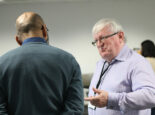A Tale of Two Cities
[prev] …university in the world, and the connection that people want to have with that. But it still doesn’t understand that it is facing real challenges, particularly in relation to transport and infrastructure, and is not keeping pace. There’s no plan, no cohesive purpose. It’s brilliant that Astra Zeneca is coming, but that also adds its own strains.’ By that, he means strains upon that already overburdened infrastructure. The Centre for Cities did a report recently that was talking about Transport for London, and it said that key cities – and I would regard Cambridge as one – need single organisations that will set the long-term agenda to support infrastructure development, to support all the growth, which we don’t have. I sit on the London-Stansted-Cambridge Consortium Board, and I see first-hand the real impact that having a mayor in London has, to actually make things happen. You need a leader, and a proper strategy.’
A JOINED-UP APPROACH
Finding a way forward, out of this situation, is a challenge – but John Bridge is clear that it must be faced.‘When we look at some of the initiatives the Government is putting forward, we see businesses from Peterborough and Cambridge going for them individually rather than collectively.’ Clearly, this is counter-productive. But what stands to be gained by a truly unified approach is great – for both the individual cities,and the county as a whole. ‘If you look at the overview, we are part of a very rich fast-growth corridor that is very economically sucessful, and which I believe could be far more powerful. We see international successes in Cambridge,particularly in bio-sciences and so on, but in Peterborough we have what’s identified as the fastest growing city in England, and actually creating more net private sector jobs than Cambridge. In the middle we have Huntingdonshire, which in itself is very successful, with an enterprise zone which is going to be significantly attractive for businesses and investors coming into the area. To succeed, you really need people working together in true partnership – when you do you really achieve so much more. We have different strengths, but by uniting them, using each of those strengths together, we can multiply the economic growth that this area can create. I do really believe that is the kind of prize we should be aiming for. But one of the key things that we are not able to do, because of all the idiosyncrasies that we have in the different levels of local authority, is actually join it all together as a real economic powerhouse, where we can really promote it collectively, as one.’
“Many elected members of parliament and councillors are focused not on long-term strategy, but on the next election”
One of the difficulties is that government itself, with enterprise partnerships, is trying to foster a business-led environment. ‘You’ve got local authorities and elected councilors – but, regretfully, many elected members of parliament and councillors are focused not on long-term strategy, but on the next election. So we’re not able to sit down and get an integrated strategy together that covers more than one small patch. And although we hear proclamations from different parts that we are working together in partnership, that doesn’t translate into practical actions. There are also reluctances in Cambridge as to whether economic growth is even good or not. People tend to forget that in business you either go forwards or you go backwards – you never stand still.
So is Cambridge guilty of burying its head in the sand? ‘No, I don’t think so,’ says Caroline Hyde. ‘The people in Cambridge who are really passionate about business growth and business development don’t for one second think that we can just sit back and let it continue. There is a general sense of continually needing to support, connect and develop the business ecology, both from an infrastructure point of view and a capital investment point of view, in addition to the coal-face business support. But I don’t think anyone would think we have to work terribly hard to stay where we are – we’re in an incredibly privileged position, and a lot of people try very hard to emulate the Cambridge Phenomenon. But I still think Cambridge misses a few tricks.’
John Bridge is quick to echo these positives in his summing up. ‘At the end of the day, we mustn’t lose sight of the importance of Cambridge, and the real necessity to continue to enable it to succeed and grow, because it is of international status and is of importance to the UK – as, indeed, is Peterborough. And I don’t think it’s a matter of saying it’s one against the other. What we need to do is find a mechanism to join up these economies in a real, practical way to benefit from the strengths of them all.’
















